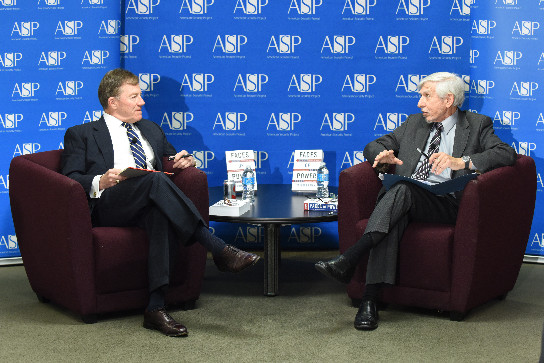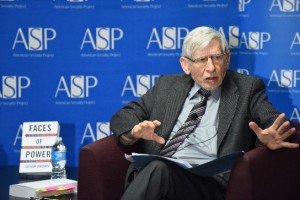
ASP Senior Fellow Seyom Brown Discusses Obama’s National Security Policy
Podcast: Play in new window | Download
Subscribe: Apple Podcasts | RSS
On Wednesday, February 25, 2015, the American Security Project hosted Dr. Seyom Brown in a discussion of President Obama’s national security policy. Dr. Brown sat down with ASP CEO BGen Stephen Cheney, USMC (Ret) and examined key questions regarding the current Administration’s national security policy choices and highlighting key resemblances to the past policies of the Ronald Reagan and George W. Bush administrations. This is the central argument in Brown’s newest book, Faces of Power: Constancy and Change in United States Foreign Policy from Truman to Obama.
Dr. Seyom Brown is an Adjunct Senior Fellow for ASP. He has also held senior research and policy analysis positions at the RAND Corporation, Brookings, the Carnegie Endowment, and the Belfer Center at Harvard University. He has also served as a Special Assistant in the Office of International Security Affairs in the Department of Defense and a Special Assistant to the Director of Policy Planning in the Department of State. Dr. Brown has taught at numerous universities, including: Harvard, Brandeis, SAIS, Columbia, Chicago, UCLA, and SMU. In addition to his newest book, he is the author of twelve books on U.S. foreign policy and international relations.
Brown opened optimistically:
“There can be no doubt that Obama has been completely dedicated to serving US national interests.”
He began by posing key questions regarding Obama’s national security policy at the outset. Some of these questions included Obama’s policy regarding the use of force, his beliefs about the biggest threats to national security, and his emphasis on human rights and democracy. Highlighting notable foreign policy decisions of past administrations (Eisenhower in the Suez Crisis, Kennedy in the Bay of Pigs, etc), Brown argued that the national security policies of the Obama’s administration in his second term closely mirror the policies of the Reagan and George W. Bush administrations in terms of action and ideology.
 On the use of force, Brown emphasized Obama’s preference for “just war” as contributing to reasons for his “hesitancy” in committing troops abroad. The Administration, he argued, views war as a last resort and sometimes necessary condition to deal with conflict. Brown addressed this hesitancy:
On the use of force, Brown emphasized Obama’s preference for “just war” as contributing to reasons for his “hesitancy” in committing troops abroad. The Administration, he argued, views war as a last resort and sometimes necessary condition to deal with conflict. Brown addressed this hesitancy:
“There are specific situations where the carrots or sticks of diplomacy need to be applied. In the toolbox of diplomacy, pressures have always been a part of foreign policy.”
When asked about changes in Obama’s foreign policy direction between his first and second terms, Brown noted an interesting comparison to the administration of Ronald Reagan. In his first term, Obama was focused on domestic well-being in the US, specifically battling unemployment and healthcare. International terrorism and conflict in the Middle East have dictated his second term’s focus, however. This runs counter to Reagan, whose first term was focused on foreign policy and defense spending while his second term had a domestic focus.
Brown hopes his book can “encourage a serious debate and dialogue about Obama’s national security policy” moving forward.






[…] ASP Senior Fellow Seyom Brown Discusses Obama’s National Security Policy […]
[…] ASP Senior Fellow Seyom Brown Discusses Obama’s National Security Policy […]